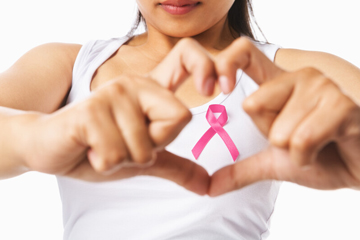
Breast cancer is the most common cancer found in American women, other than skin cancer. The American Cancer Society (ACS) estimated that there will be 268,600 new cases of invasive breast cancer diagnosed in women in the US in 2019. Awareness campaigns have done a lot to throw light on the disease, helping women to take informed decisions about their health. This is well reflected in the breast cancer death rate which declined by 1.8% a year from 2007 to 2016. Early detection can make the disease easier to treat. And for this, it’s important for you to understand the risk factors for breast cancer. Maintaining a healthy lifestyle is crucial to ensure that your breast cancer risk is as low as possible.
Breast Cancer – Risk Factors
The term “risk” is used to refer to a number or percentage that describes how likely a certain event is to occur (www.breastcancer.org). Several factors can increase or decrease the risk of developing breast cancer, either for the first time or as a recurrence. There are two different types of risk: established and emerging risks.
The main established risks include: genetic predisposition and family history; natural oestrogen; oestrogen in pharmaceutical products; weight gain and lack of exercise, and alcohol consumption. The emerging risks factors are those that are still under study, that is, newly suspected risk factors.
- Low Vitamin D levels: Vitamin D helps the body absorb calcium, which is essential for good bone health and proper functioning of the immune, muscle, and nervous systems. Research suggests that women with low levels of vitamin D have a higher risk of breast cancer, as vitamin D may play a role in controlling normal breast cell growth and could stop breast cancer cells from growing.
To boost your Vit D levels, get more direct sunlight exposure and take vitamin D3 supplements.
- Light exposure especially at night: Results of some studies imply that women who work at night (like doctors, factory workers, nurses, and police officers) have a higher risk of breast cancer compared to women who work during the day. Similarly, studies suggest that women who live in areas with high levels of external light at night (street lights) have a higher risk of breast cancer. It is believed that increase in risk is linked to melatonin levels, that is, melatonin levels tend to stay low in women who work at night or in those who are exposed to external light at night.
Installing blackout shades on bedroom windows can help control excess light exposure at night. Use low-wattage or red bulbs in nightlights and install a low-wattage or red-bulb nightlight in your bathroom(s).
- Diethylstilbestrol Exposure: Back in 1940s through the 1960s, pregnant women were given Diethylstilbestrol (DES) to prevent miscarriage. Those who took DES have a slightly higher risk of breast cancer, and women who were exposed to DES while their mothers were pregnant with them also may have slightly higher risk of breast cancer later in life.
The best option is to consult doctor at a DES clinic who has expertise in this area. Maintaining a healthy lifestyle can minimize your risks.
-
- Unhealthy Food: According to one study, girls who eat a high-fat diet during puberty, even if they don’t become overweight or obese, may have a higher risk of developing breast cancer later in life. However, research on adult women in the United States hasn’t found any link between breast cancer risk and dietary fat intake. There is no food that can prevent cancer (www.breastcancer.org). What you can do is to eat more of foods that can make and keep your body as healthy as possible and boost your immune system.
This can help keep your risk for breast cancer as low as possible. The ACS recommends eating at least 2.5 cups of fruits and veggies a day, limiting processed and red meats, and choosing whole grains to help reduce risks of all types of cancer.
- Unhealthy Food: According to one study, girls who eat a high-fat diet during puberty, even if they don’t become overweight or obese, may have a higher risk of developing breast cancer later in life. However, research on adult women in the United States hasn’t found any link between breast cancer risk and dietary fat intake. There is no food that can prevent cancer (www.breastcancer.org). What you can do is to eat more of foods that can make and keep your body as healthy as possible and boost your immune system.
- Exposure to Chemicals in Cosmetics, Sunscreen: While cosmetics make us look, feel and smell good, research strongly suggest that at certain exposure levels, some of the chemicals in cosmetics may contribute to the development of cancer. Sunscreen can protect us from the sun’s harmful ultraviolet rays, but at the same time, research implies that at certain exposure levels, some of the chemicals in some sunscreen products may cause cancer.
Reduce your exposure to parabens and phthalates in cosmetics and instead of wearing chemical sunscreen, try to wear a sunscreen that contains zinc or titanium. Avoid going outside when the sun is at its peak, usually from 10 a.m. to 4 p.m.
- Exposure to plastics: Research suggest that some chemicals in plastic products, such as bisphenol A (BPA), and chemicals in lawn and garden products, may cause cancer.
While it may not be possible to completely avoid all plastic products, use them as little as possible, especially if you’re pregnant. Never use it around food.
Talk to your doctor about all of your possible risk factors for breast cancer. Your doctor can advise you on steps to take to lower your risk of breast cancer.
